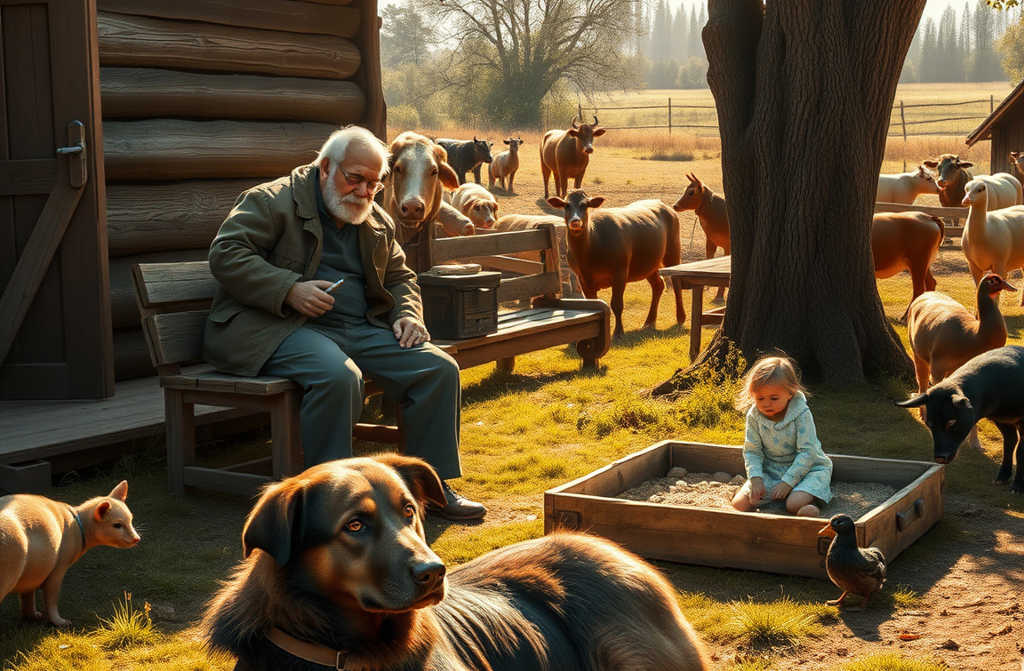З життя
Come Along With Me!

Many years ago, in the quiet English countryside, old man Alfred took his bicycle and rode toward the village, glancing over his shoulder more than once. No one followed.
She was a dog unlike any otherwhat folk might call “untamed.” Once, long ago, while gathering hazelnuts in the woodlands, Alfred had stumbled upon a half-grown pup. God only knew how she had ended up deep in those wild thickets.
She wandered silently, untethered, a small, rain-drenched creature. Alfred frowned and stepped closer. She was awkward, not much to look atbut then she lifted her dark eyes to him. Not the eyes of a pup, but of something older, wiser. He hesitated, then spoke gruffly.
“Come with me. My yards without a dog just now. Youll make a good guardI shant treat you ill.”
He mounted his bicycle and pedalled home. More than once, he looked back, but no one gave chase. By the time he reached his farm, hed nearly forgotten the encounter.
The farm was no small affairthree pigs, a sow with ten piglets, a cow called Daisy, a dozen chickens, six ducks with their brood, and a cat named Grimalkin. Alfred rolled his pipe tobacco, pushed open the gate, and settled onto the bench by the houseonly to freeze.
Those dark eyes watched him, unblinking.
“Well? Coming in, then?” he muttered after a long silence. The pup backed away, vanishing into the dusk.
This went on for days. Every evening, those eyes would appear, watching, judging, searching for something in him. Then, one night as Alfred sat smoking, she approached, sniffed him, and lay at his feet.
Alfred was no soft man. Livestock was livestockhed slaughtered his share of pigs, cows, fowl. Dogs were for guarding, cats for mousing. He couldnt recall how many had come and gone under his caresome poisoned, others lost to sickness. The kennel stood empty since old Thunder had passed that spring. The vet said it was ticks. No one had mourned muchAlfred was a hard man, sparing with his tears.
His wife, Edith, was tougher still. The whole village remembered the time she felled a calf with one punch between the eyes for butting her at the trough.
Alfred exhaled smoke and studied the pup at his feet. Those dark eyes studied him back.
“So, beast, youve decided to stay, eh? Listen well. Ill feed you twice a day, what God provides. The kennels warm. Ill let you loose some nightsthree hours, no more. Youll guard this yard. No stranger passes without fear. Agreed? Then come along.”
And so began her new life. Alfred named her Stellawhere hed heard such a fine name, no one knew. She had a warm kennel now, a sprawling farm, and a chain.
Time passed, and the awkward pup grew into a magnificent hound the whole village feared. Some whispered she had wolfs bloodshe was that striking, that unusual. She didnt wag her tail or lick hands. When Alfred, Edith, or their kin approached, she merely watched with those knowing eyes.
But strangers? Shed have torn them apart. She scarcely barkedjust a low, terrible growl. So they moved her kennel to the far field, lest folk fear knocking at the gate.
At night, Alfred would sometimes unleash her with a stern order: “Three hours. Be back. The milkmaids shant fear their dawn rounds on account of you.”
Never once did she harm a soul. Perhaps she had other pursuits. Yet always, at the appointed hour, Alfred found her waitingearning his respect.
Stella bore litters regularly, and though the village feared her, her pups were prized. Folk came from neighbouring hamlets for them. She was respectedshe only acted when provoked.
One summers day, after breakfast, Stella drowsed by her kennel, one eye on little Mary playing in the sandpit under the great oak, the other on Edith tending her cabbage patch. Edith often tethered Mary to the tree while she workedthe child was barely three, visiting on weekends with her parents.
And every time, Mary would run to Stella, arms wide, crying, “Teh-ella! Teh-ella!”
That wretched day, Stella watched them boththen dozed.
She awoke to claws raking her nose. Grimalkin crouched before her, hissing, “Do something! Marys drowning!”
Stella looked past the fence. No Mary in the sandpit, no Mary on the swing.
“By the pond,” Grimalkin rasped. “Fetching her bonnet from the water. Hurry!”
Stella barkedlouder than ever in her life. She leapt, straining at her chain.
Edith straightened, scowled. “Mad creature,” she muttered, and returned to her cabbages.
Then Stella howled. Not a dogs crya wolfs, terrible and echoing.
Edith paled. Neighbours came running.
They pulled Mary from the pond just in time. The village was in uproardoctors came, Marys parents wept with relief.
That evening, a delegation came to Stella: Marys father, William, his wife, and Alfred.
William knelt before her. “Thank you. You saved my girl. Come live with us in the city. Youll have a grand kennel, the best food, long walks.”
Stella met his gaze with those dark eyes. Then she laid her head upon his shoulderbrieflybefore returning to Alfreds side.
The old man stood stiff, uncertain of such affection. Only then did the hard mans treacherous tears fall.

















